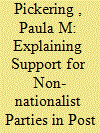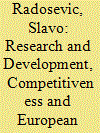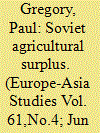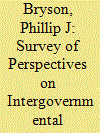| Srl | Item |
| 1 |
ID:
088378


|
|
|
|
|
| Publication |
2009.
|
| Summary/Abstract |
Parties willing to engage in cross-ethnic political cooperation are essential for the stability and democracy of ethnically divided post-conflict states. The investigation of voting in Macedonia and Bosnia, which are similarly small, impoverished, ethnically fragmented and threatened states that arose out of Yugoslavia, helps uncover factors that encourage voters to support parties willing to engage in cooperative multiethnic governance. Analysis of survey data suggests that supporters of the non-nationalist challengers in the first post-violence elections expressed both strong positive associations with the past communist system and clear negative assessments of the governing record of the incumbent nationalists, sentiments that were stronger among Macedonians than among Bosniaks. Data, however, call into question popular contentions that voters' support for non-nationalists is rooted in their social tolerance or engagement in civil society. The finding that Macedonian support for non-nationalist parties is partly due to negative voting combines with difficult domestic social and economic conditions, unfriendly neighbours and uncertain regional integration processes to suggest continuing challenges for Macedonia.
|
|
|
|
|
|
|
|
|
|
|
|
|
|
|
|
| 2 |
ID:
088380


|
|
|
|
|
| Publication |
2009.
|
| Summary/Abstract |
This article explores the relationship between research and development (R&D) and competitiveness of South East European (SEE) economies from the perspective of European Union (EU) integration. Specifically, the article addresses the question of whether South East Europe is a potential asset or liability to the enlarged EU. SEE countries are quite diverse in terms of levels of competitiveness, with visible effects on the role of R&D, which is confirmed by analysis of R&D demand and supply factors. Improvements in the national innovation systems of SEE countries have largely taken place through vertical linkages on the supply and demand sides. However, a wider role for R&D will depend increasingly on the strength of horizontal linkages within national systems of innovation and their key agent-the local innovative business enterprise sector. This calls for a rethinking of science and technology policy, traditionally defined as a sectoral activity.
|
|
|
|
|
|
|
|
|
|
|
|
|
|
|
|
| 3 |
ID:
088383


|
|
|
|
|
| Publication |
2009.
|
| Summary/Abstract |
This article uses the transcripts of the Central Committee Plenums from December 1928 to November 1929 to re-evaluate James Millar's three propositions concerning collectivisation and the net agricultural surplus. It finds that the debate between Stalin and Bukharin was indeed consistent with Millar's analysis and it supplies new information on the role of markets, repression and primitive accumulation. I examine these questions against the backdrop of the Central Committee transcripts to determine whether the principals truly aimed to increase the agricultural surplus as defined by Millar, their respective positions on coercion, and the role of Marxist ideology in their decision making. The aim is to discover what the actual decision makers expected from collectivisation and the extent to which they (or their critics) were aware of the possible unanticipated consequences of their actions.
|
|
|
|
|
|
|
|
|
|
|
|
|
|
|
|
| 4 |
ID:
088382


|
|
|
|
|
| Publication |
2009.
|
| Summary/Abstract |
The large-scale demonstrations that took place in Georgia in early March 1956 following Khrushchev's criticism of Stalin at the 20th Party Congress were the first significant expressions of public protest and civil disobedience in the Soviet Union for decades, and they also bore a clearly nationalistic character. Based primarily on materials from the Georgian KGB and Party archives and interviews with former Party officials and participants of the events, this article examines potential interpretations of these events derived from elite incorporation and ethnic mobilisation theories.
|
|
|
|
|
|
|
|
|
|
|
|
|
|
|
|
| 5 |
ID:
088385


|
|
|
|
|
| Publication |
2009.
|
| Summary/Abstract |
The results of a survey of local government officials from the Slovak and Czech Republics taken in December of 2005 are presented and analysed. Attitudes about and perspectives on intergovernmental fiscal relations in the two republics are probed. Differences and similarities in Czech and Slovak views are established regarding some of the perceptions of local autonomy and the sufficiency of available funds; whether or not public services are supplied by the appropriate levels of government; the potential benefits of adopting a serious rather than a nominal property tax; and the flexibility of local budget planning in Czech and Slovak cities and towns.
|
|
|
|
|
|
|
|
|
|
|
|
|
|
|
|
| 6 |
ID:
088379


|
|
|
|
|
| Publication |
2009.
|
| Summary/Abstract |
This article analyses the politics of Russian climate change by pinpointing how global warming has been framed over a seven year period in a government-owned, leading daily newspaper, Rossiiskaya Gazeta, and how climate experts have intervened in such framings. Russia's climate politics is first summarised and then three framings of climate change are identified and examined. Secondly, the role that expert voices play in the framing of climate change is discussed. The article concludes with a presentation of key findings about scientists' involvement in public debate and hypotheses about the overall trajectory of Russian climate politics.
|
|
|
|
|
|
|
|
|
|
|
|
|
|
|
|